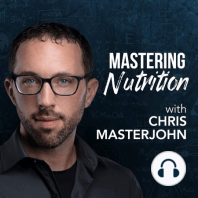22 min listen

Niacin, Part 2: Blood Tests, Foods, and Supplements | Mastering Nutrition #62
Niacin, Part 2: Blood Tests, Foods, and Supplements | Mastering Nutrition #62
ratings:
Length:
141 minutes
Released:
Mar 16, 2019
Format:
Podcast episode
Description
In part 1 we covered what niacin is and why you need it. Here’s part 2, where Alex Leaf and I cover blood tests, foods, and supplements! How much do we need? The RDA has some flaws, including claiming women need less than men, when all the evidence shows women need *more* than men. Why eating enough protein is so essential, yet so unreliable as a way of boosting niacin status. How the niacin in your coffee, seeds, and grains is all locked up and unavailable, and how to release it through proper preparation. Do you drink light roast or dark roast? You may either hate or love this episode… or you might just switch coffees. Should we take high-dose niacin to lower cholesterol? Alex has a theory on how we can do that without getting diabetes. ? High-dose niacin can cause liver failure and can kill lab mice. But Alex and I know how to steer clear of that problem! NAD-boosting supplements are the new darling of the anti-aging industry. But should we take nicotinamide riboside (NR), nicotinamide mononucleotide (NMN), or should we endure all the whole-body burning ? that the folks injecting NAD+ are so hyped up about? We discuss the promises and problems of these approaches. Why you should match glycine to one form of niacin and trimethylglycine (TMG) to all of them. This episode is brought to you by Ancestral Supplements' "Living" Collagen. Our Native American ancestors believed that eating the organs from a healthy animal would support the health of the corresponding organ of the individual. Ancestral Supplements has a nose-to-tail product line of grass-fed liver, organs, "living" collagen, bone marrow and more... in the convenience of a capsule. For more information or to buy any of their products, go to https://chrismasterjohnphd.com/ancestral This episode is brought to you by Ample. Ample is a meal-in-a-bottle that takes a total of two minutes to prepare, consume, and clean up. It provides the right balance of nutrients needed for a single meal, all from a blend of natural ingredients. Ample is available in original, vegan, and keto versions, portioned as either 400 or 600 calories per meal. I'm an advisor to Ample, and I use it to save time when I'm working on major projects on a tight schedule. Head to https://amplemeal.com and enter the promo code “CHRIS15” at checkout for a 15% discount off your first order.” In this episode, you will find all of the following and more: Niacin Part 2 Show Notes 00:38 Cliff Notes 01:35 Recap of Part 1 15:32 Markers of niacin status 17:32 Methylated metabolites of niacin in the urine as a marker of niacin status 19:05 Caveat to using methylated metabolites of niacin in the urine as a marker of niacin status 20:16 Erythrocyte NAD(H)/NADP(H) ratio, the “niacin number,” as a marker of niacin status 22:55 Caveat to the niacin number as a marker of niacin status 28:34 Critique on how the RDA for niacin was established 40:12 How protein intake affects the dietary requirement for preformed niacin 42:48 Estrogen regulates the synthesis of niacin from tryptophan. 43:35 In men in particular, niacin synthesis from tryptophan might just be a way to clear excess tryptophan. 45:31 General discussion about protein requirements 49:46 How different forms of food processing, such as nixtamalization, fermentation, and sprouting, increase the bioavailability of niacin 52:51 Niacin in coffee 53:52 Niacin in nutritional yeast 54:16 Dietary sources of niacin, divided into five tiers 59:57 Niacin in herbs and spices, including spirulina 01:03:46 The contribution of the microbiome to niacin status is not well studied. 01:04:56 Where we would expect to see niacin deficiency 1:05:38 Risk factors for niacin deficiency include Hartnup’s disease, megaduodenum, intestinal malabsorption, carcinoid tumors, certain drugs, alcoholism, HIV/AIDS, and deficiencies of iron, riboflavin, and B6. 01:09:52 Risk factors for suboptimal niacin status include a diet based on unprocessed whole grains, a diet based on sugar and fat, a
Released:
Mar 16, 2019
Format:
Podcast episode
Titles in the series (100)
001: Coffee: Why I drink coffee and won't apologize for it, but why I'm skeptical of the large body of literature associating coffee consumption with reduced disease risk. Do we drink coffee by choice? Sort of. I discuss why our genes may play a role in our coffee... by Mastering Nutrition